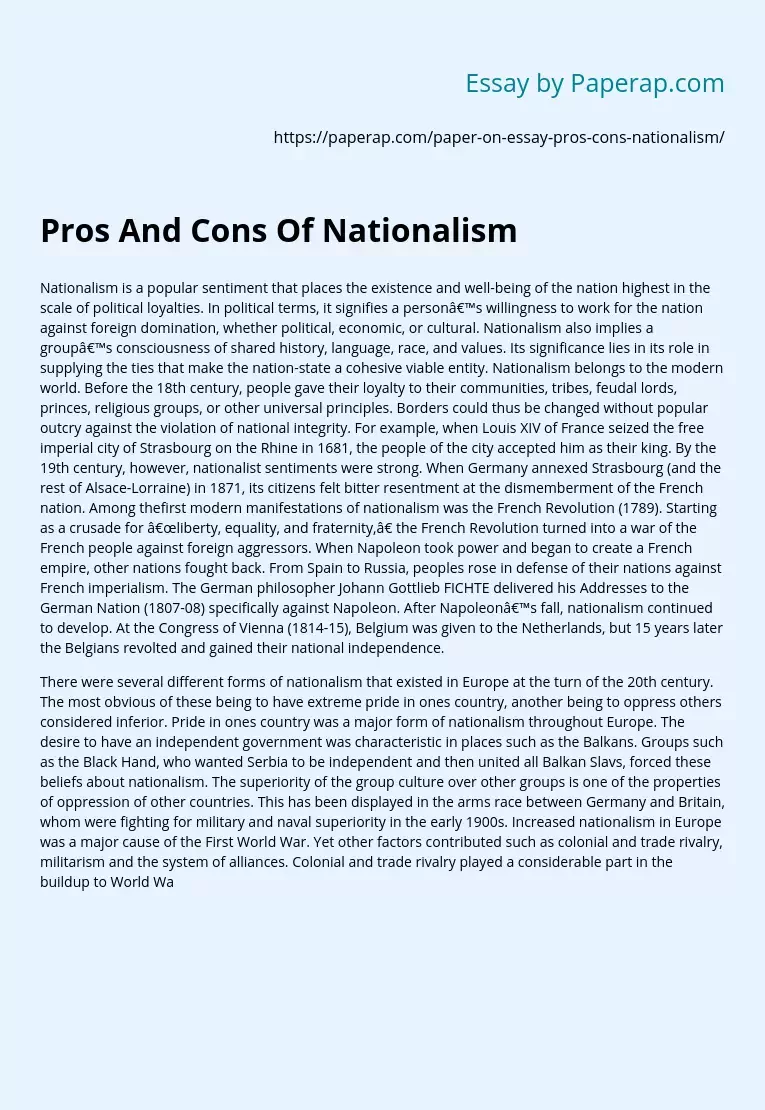Pros And Cons Of Nationalism
Nationalism is a popular sentiment that places the existence and well-being of the nation highest in the scale of political loyalties. In political terms, it signifies a person’s willingness to work for the nation against foreign domination, whether political, economic, or cultural. Nationalism also implies a group’s consciousness of shared history, language, race, and values. Its significance lies in its role in supplying the ties that make the nation-state a cohesive viable entity. Nationalism belongs to the modern world.
Before the 18th century, people gave their loyalty to their communities, tribes, feudal lords, princes, religious groups, or other universal principles. Borders could thus be changed without popular outcry against the violation of national integrity. For example, when Louis XIV of France seized the free imperial city of Strasbourg on the Rhine in 1681, the people of the city accepted him as their king. By the 19th century, however, nationalist sentiments were strong. When Germany annexed Strasbourg (and the rest of Alsace-Lorraine) in 1871, its citizens felt bitter resentment at the dismemberment of the French nation.
Among thefirst modern manifestations of nationalism was the French Revolution (1789). Starting as a crusade for “liberty, equality, and fraternity,” the French Revolution turned into a war of the French people against foreign aggressors. When Napoleon took power and began to create a French empire, other nations fought back. From Spain to Russia, peoples rose in defense of their nations against French imperialism. The German philosopher Johann Gottlieb FICHTE delivered his Addresses to the German Nation (1807-08) specifically against Napoleon.
After Napoleon’s fall, nationalism continued to develop. At the Congress of Vienna (1814-15), Belgium was given to the Netherlands, but 15 years later the Belgians revolted and gained their national independence.
There were several different forms of nationalism that existed in Europe at the turn of the 20th century. The most obvious of these being to have extreme pride in ones country, another being to oppress others considered inferior. Pride in ones country was a major form of nationalism throughout Europe. The desire to have an independent government was characteristic in places such as the Balkans. Groups such as the Black Hand, who wanted Serbia to be independent and then united all Balkan Slavs, forced these beliefs about nationalism. The superiority of the group culture over other groups is one of the properties of oppression of other countries. This has been displayed in the arms race between Germany and Britain, whom were fighting for military and naval superiority in the early 1900s. Increased nationalism in Europe was a major cause of the First World War. Yet other factors contributed such as colonial and trade rivalry, militarism and the system of alliances. Colonial and trade rivalry played a considerable part in the buildup to World War One. Yet without the aid of nationalism, this rivalry would not have been such a major factor. Towards the turn of the 1900s all of the European Powers were determined to gain colonies to build their empires. Disputes between several Powers over various colonies created visible tension within Europe. As a result of this rivalry, many colonies soon adopted nationalistic, almost imperialistic beliefs, wishing to have self-domination. An example of this was the way Serbia rose against Austria-Hungary towards the end of the 1800s, fighting for independence. Militarism was another prominent factor that led to World War One, yet cannot be solely responsible. In the early 1900’s major countries, including all Powers, in Europe began spending increasing amounts of money on the expansion of military and naval forces.
Pros Of Nationalism
Pros And Cons Of Nationalism. (2019, Dec 05). Retrieved from https://paperap.com/paper-on-essay-pros-cons-nationalism/

